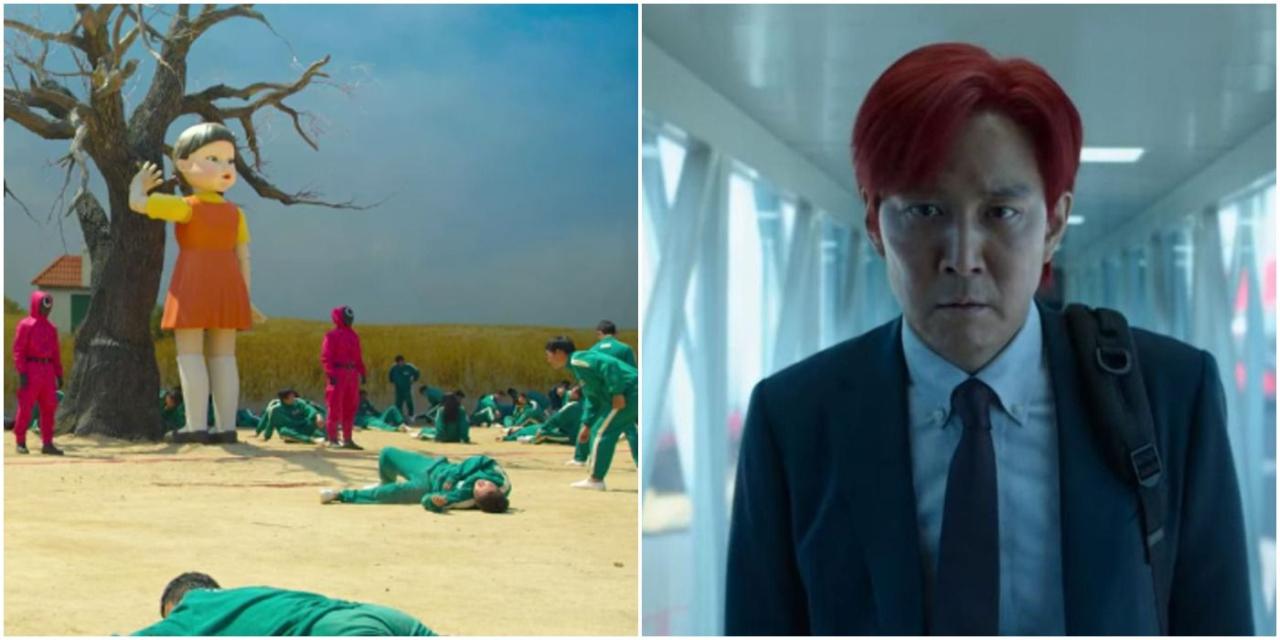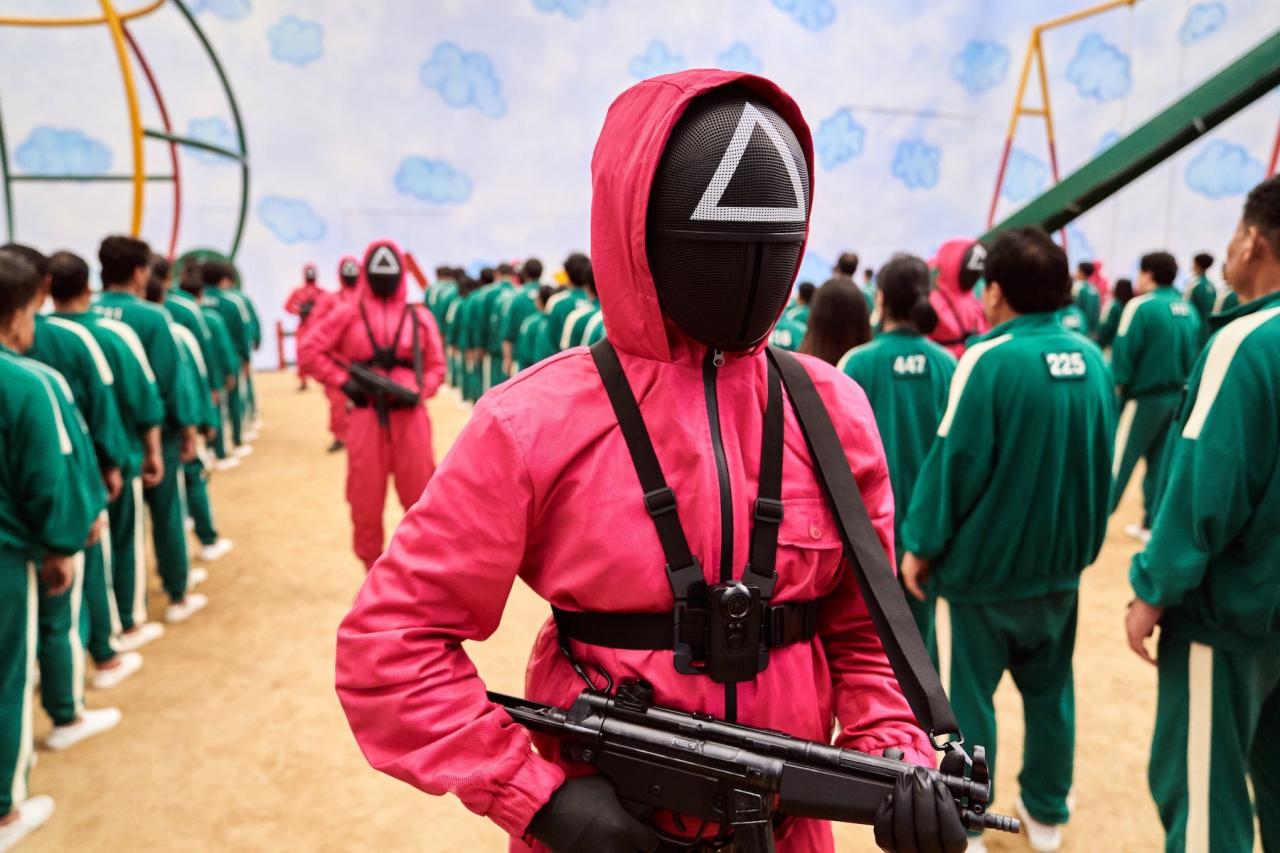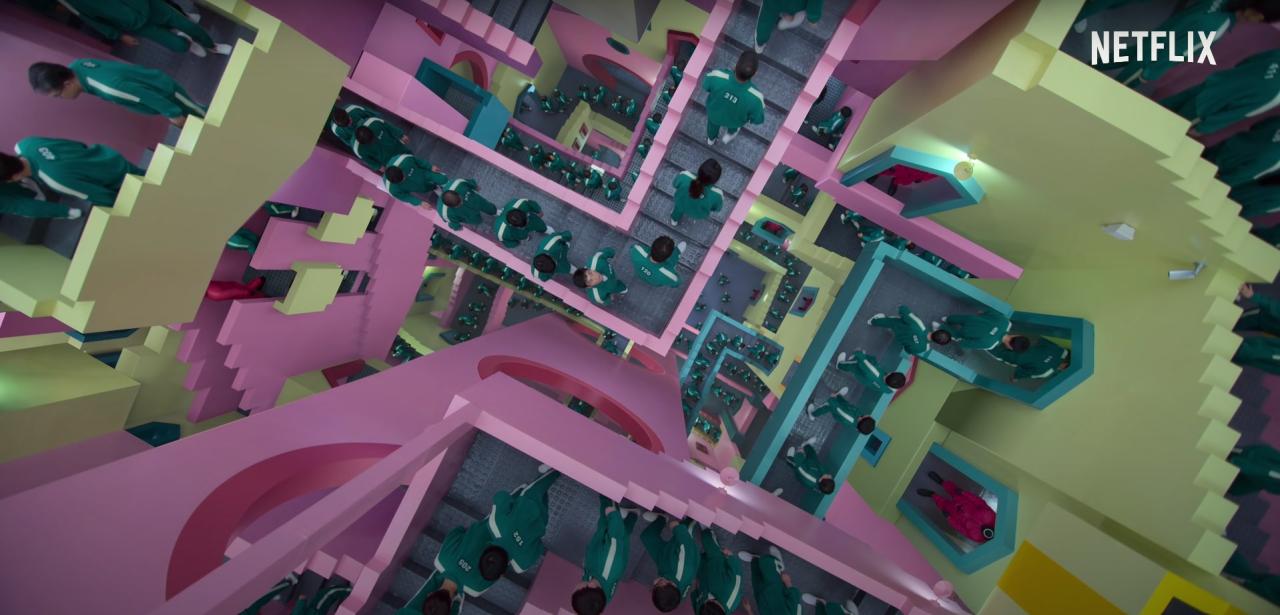Is the Squid Game story based on a true event? That’s the burning question many viewers have after witnessing the brutal and captivating games. While the show’s shocking visuals and high-stakes competition feel intensely real, the truth lies in a blend of inspiration and creative storytelling. We’ll delve into the show’s origins, exploring the real-world influences that shaped its narrative and separating fact from fiction.
This isn’t about confirming a single true event, but rather understanding the societal anxieties and cultural elements that fueled Squid Game’s creation.
The series draws heavily from the realities of economic disparity and societal pressures, reflecting similar struggles faced across the globe. We’ll examine the specific Korean children’s games that inspired the show’s deadly contests, comparing them to similar real-world games with potentially dangerous consequences. By analyzing the show’s allegorical nature and its impact on global conversations about social justice, we’ll get a clearer picture of where the line between inspiration and reality truly lies.
The Inspiration Behind Squid Game: Is The Squid Game Story Based On A True Event?

Squid Game’s immense popularity stems not only from its thrilling premise but also from its unsettlingly realistic portrayal of societal and economic anxieties prevalent in many parts of the world. The show’s brutal games serve as a stark metaphor for the desperation and inequality faced by individuals struggling to survive in a hyper-competitive system.
Societal and Economic Issues Reflected in Squid Game
The show vividly depicts the crushing weight of debt, unemployment, and the desperation of those struggling to provide for their families. Characters are driven to participate in the deadly games by their dire financial circumstances, highlighting the systemic issues that can push vulnerable individuals to extreme measures. This resonates with real-world situations in countries facing high levels of income inequality, where a significant portion of the population struggles to access basic necessities or escape a cycle of poverty.
So, is the Squid Game story based on a true event? Nope, it’s fiction, but the show’s themes of desperation and inequality resonate with real-world struggles. Speaking of spectacle, check out the amazing visuals from the Shanghai 2024 New Year’s Eve drone show highlights ; it’s a far cry from the deadly games, but equally captivating. Ultimately, though, the question remains: is Squid Game’s dark vision of society a reflection of our own realities?
Examples include the widening gap between the rich and poor in many developed nations and the struggles faced by individuals in developing countries with limited economic opportunities. The show’s depiction of societal pressure and the competitive nature of modern life also mirrors real-world experiences, particularly for those living in highly competitive environments.
Real-Life Games with High Stakes and Potentially Deadly Consequences, Is the Squid Game story based on a true event?
While Squid Game’s games are fictional, history offers examples of real-life competitions with incredibly high stakes and potentially deadly outcomes. The Roman gladiatorial contests, for instance, pitted individuals against each other in brutal combat for the entertainment of the masses. While not directly comparable in structure to Squid Game, they share the element of life-or-death competition for survival and entertainment.
So, is the Squid Game story based on a true event? Nope, it’s fictional, but the desperation it portrays is sadly relatable. Think about the scale of that – it’s mind-boggling compared to something like seeing the incredible visuals of China’s biggest New Year drone shows of 2024 , which are amazing feats of technology and planning.
But back to Squid Game – the show’s power lies in its exploration of societal issues, not its basis in reality.
Similarly, historical accounts of various forms of dueling, often fought to settle disputes of honor, carry the potential for lethal consequences. These historical precedents demonstrate that the concept of high-stakes competition with life-threatening risks, while extreme, isn’t entirely foreign to human experience.
Historical Context of Children’s Games in South Korea
Many of the games featured in Squid Game are based on traditional Korean children’s games. These games, played for generations, form a significant part of Korean cultural heritage. Their inclusion in the show adds a layer of unsettling familiarity, contrasting the innocent origins of these games with the deadly context in which they are played. The show’s creators likely drew inspiration from the nostalgic recognition these games would evoke in a Korean audience while simultaneously using them to highlight the stark contrast between childhood innocence and the brutal realities of adult life under immense pressure.
Comparison of Squid Game Games to Similar Real-World Games
| Squid Game Game | Real-World Counterpart | Similarities | Differences |
|---|---|---|---|
| Red Light, Green Light | Traditional children’s game | Basic rules, reliance on physical skill and obedience | Life-or-death consequences; heightened stakes |
| Honeycomb Candy Challenge | Traditional Korean candy-making and eating | Skill-based, requires precision | Failure results in death; pressure is amplified |
| Tug-of-War | Traditional team game | Physical strength and teamwork required | Elimination is permanent; heightened physical and psychological pressure |
| Marbles | Traditional children’s game | Strategy and deception involved | High stakes, betrayal and manipulation are key elements |
Debunking Common Myths about the Show’s Origin

Let’s address the persistent rumors that the wildly popular Netflix series, Squid Game, is based on a true story. While the show’s brutal depiction of desperate individuals competing in deadly children’s games certainly resonates with anxieties about societal inequality and economic hardship, it’s crucial to understand that it’s a work of fiction, inspired by various sources, not a direct adaptation of a real-life event.The show’s creator, Hwang Dong-hyuk, has consistently emphasized the fictional nature of Squid Game.
His inspiration stemmed from a blend of personal experiences, societal observations, and existing narratives, rather than a single, verifiable real-world incident. He drew upon his own struggles and observations of South Korean society, particularly the pressures of competition and the widening gap between the rich and poor. The games themselves are a nod to childhood games, adding a layer of unsettling irony to the deadly context.
So, is the Squid Game story based on a true event? Nope, it’s fiction, but the social commentary is real. Need a break from all that intense drama? Check out some seriously awesome visuals – like the incredible light show in the Best videos of the Shanghai Chinese New Year drone show – before you dive back into pondering the bleak realities explored in Squid Game.
It’s a nice contrast!
The Show’s Creators’ Statements on Reality
Hwang Dong-hyuk has repeatedly stated that Squid Game is not based on a specific true event. He has clarified that the show is a commentary on societal issues, using the extreme setting of deadly games to highlight the desperation and inequalities faced by many. Interviews and articles featuring the creator consistently emphasize the fictional nature of the plot, while acknowledging the universality of the themes explored.
He has often cited his own personal experiences and his observations of societal pressures as the primary wellspring of his inspiration. These statements, readily available in various reputable media outlets, directly counter the misconception that the show is a direct retelling of a real-life incident.
Distinguishing Inspiration from Direct Adaptation
To clarify the difference between inspiration and direct adaptation, consider this: The show’s premise, deadly children’s games with high stakes, is not based on a single documented event. Instead, the concept draws inspiration from various sources – the director’s personal experiences with poverty and societal pressure, the universality of childhood games, and the general concept of survival games found in other forms of media.
This is a creative process of combining and reinterpreting existing elements to craft a unique narrative. The show is not a documentary; it’s a fictional story that uses real-world anxieties as its backdrop.
Infographic: Inspiration vs. Direct Adaptation
Imagine a two-panel infographic. The left panel, titled “Direct Adaptation,” shows a photograph of a newspaper clipping detailing a specific real-life event (e.g., a historical account of a deadly competition). Arrows point from the clipping to a film reel depicting a near-identical re-enactment of that event. The caption reads: “Directly based on documented facts. The story mirrors a real event.” The right panel, titled “Inspiration,” shows a collage of images: a photo of a struggling family, images of classic children’s games, and a depiction of a dystopian city.
No, the Squid Game isn’t based on a true story, it’s a fictional thriller. However, the show’s exploration of extreme debt and societal inequality highlights real-world issues that impact many businesses, such as those involved in the rapidly growing drone industry – check out this event for more info: business opportunities in that sector. Ultimately, while Squid Game is pure fiction, its themes resonate with the harsh realities faced by individuals struggling within complex economic systems.
Arrows connect these images to a film reel showing the fictional world of Squid Game. The caption reads: “Inspired by various elements. Real-world themes are used to create a fictional narrative.” This visual representation clearly distinguishes between a direct adaptation and a story inspired by various real-world aspects.
Exploring the Show’s Allegorical Nature
Squid Game isn’t just a thrilling spectacle of violence and suspense; it’s a potent allegory for the anxieties and inequalities prevalent in modern capitalist societies. The show uses exaggerated scenarios and symbolic imagery to highlight the desperation and ruthlessness that can arise from systemic issues, forcing viewers to confront uncomfortable truths about our own world. The seemingly fantastical games become a powerful lens through which we can examine real-world problems of debt, social mobility, and the widening gap between the rich and the poor.The extreme scenarios depicted in Squid Game serve as a heightened reflection of real-world pressures.
The characters’ desperation to win, even at the cost of their lives, mirrors the struggles faced by many individuals grappling with crushing debt and a lack of opportunity. The stark contrast between the opulent lifestyles of the VIPs and the impoverished conditions of the players underscores the vast economic disparities that fuel social unrest. By amplifying these elements to an almost absurd degree, the show compels viewers to consider the underlying societal structures that create such extreme situations.
Squid Game’s Thematic Parallels
Squid Game’s themes resonate with numerous other works of fiction and documentary. The desperate struggle for survival against insurmountable odds echoes narratives found in dystopian fiction like Suzanne Collins’The Hunger Games*, where participants are forced to compete for survival. Similarly, the show shares thematic similarities with documentaries exploring global poverty and economic inequality, such as Michael Moore’s
Capitalism
A Love Story*, which exposes the devastating consequences of unchecked capitalism. The dehumanization of the players in Squid Game also reflects the experiences of marginalized communities documented in works focusing on social injustice and exploitation. The show, however, offers a uniquely visceral and immediate engagement with these themes, making them powerfully relevant to a contemporary audience.
Key Allegorical Elements in Squid Game
The following list details some of the key allegorical elements present in Squid Game and their real-world counterparts. These elements are not simply decorative; they are integral to the show’s critique of societal structures and power dynamics.
- The Games: Represent the ruthlessly competitive nature of modern society, where individuals are forced to compete for scarce resources and opportunities. The seemingly childish games highlight the absurdity and cruelty of a system that pits people against each other for survival.
- The VIPs: Symbolize the wealthy elite who profit from and perpetuate the system of inequality. Their detached observation of the games reflects the indifference of the powerful towards the suffering of the less fortunate.
- The Debt-Ridden Players: Represent the vulnerable segments of society struggling under the weight of economic hardship and limited opportunities. Their desperation to escape their circumstances underscores the systemic failures that lead to such dire situations.
- The Guards: Represent the enforcers of the system, blindly following orders and perpetuating the cycle of violence and inequality. Their lack of empathy highlights the dehumanizing effects of power.
- The Setting: The isolated island setting symbolizes the alienation and isolation experienced by many in a hyper-competitive and increasingly unequal world.
The Impact of Squid Game’s Popularity on Public Perception

Squid Game’s unprecedented global success transcended mere entertainment; it ignited widespread conversations about pressing societal issues. The show’s visceral depiction of extreme poverty, crippling debt, and the brutal consequences of unchecked capitalism resonated deeply with audiences worldwide, prompting reflection and debate on economic inequality and social justice.The show’s popularity significantly influenced public discussions on these issues. Its allegorical nature allowed viewers to connect the fictional games to real-world struggles, fostering a renewed interest in exploring systemic injustices and their impact on vulnerable populations.
This sparked a wave of online and offline discussions, generating significant media coverage and influencing public policy debates in some regions.
Real-World Responses to Squid Game’s Themes
The show’s impact is evident in the numerous articles, social media trends, and public discussions it generated. News outlets worldwide published analyses connecting the show’s themes to real-world economic disparities and social inequalities. Social media platforms buzzed with conversations about the show’s relevance to issues such as predatory lending, the gig economy, and the widening gap between the rich and the poor.
For example, #SquidGame became a trending hashtag, with users sharing their thoughts, creating memes, and engaging in discussions about the show’s social commentary. Articles appeared in publications like The New York Times and The Guardian exploring the show’s critique of capitalism and its reflection of global economic anxieties. These discussions weren’t confined to online spaces; the show’s themes were also debated in academic settings, prompting critical analyses of its social and political implications.
Ethical Implications of Extreme Competition and Survival Games
Squid Game forced a global reckoning with the ethical implications of extreme competition and the normalization of violence in the pursuit of survival. The show’s depiction of individuals driven to desperate measures by economic hardship sparked conversations about the ethical responsibilities of corporations and governments in ensuring fair and equitable opportunities for all. The brutal nature of the games prompted debates on the dehumanizing effects of unchecked competition and the potential dangers of entertainment that glorifies violence.
This led to discussions about responsible content creation and the potential impact of media on societal values and behaviors. The show’s popularity also triggered debates about the ethical boundaries of reality TV and the potential exploitation of vulnerable individuals for entertainment purposes.
Timeline of Squid Game’s Impact on Public Discourse
| Date | Event | Impact on Public Discourse | Source |
|---|---|---|---|
| September 17, 2021 | Release of Squid Game on Netflix | Initial surge in viewership and online discussions about the show’s plot and themes. | Netflix |
| October 2021 | Squid Game becomes a global phenomenon, breaking Netflix viewership records. | Increased media coverage and academic analyses of the show’s social and political commentary. | Various news outlets |
| November 2021 – Present | Ongoing discussions about the show’s themes of economic inequality, social justice, and the ethics of extreme competition. | Continued engagement on social media, in academic circles, and in public policy debates. | Social media platforms, academic journals, news articles |
Outcome Summary

So, is Squid Game based on a single true event? No. However, its power lies in its reflection of very real societal issues and anxieties. The show cleverly uses familiar childhood games as a framework to explore themes of desperation, inequality, and the lengths people will go to for survival. By examining the show’s inspiration and allegorical elements, we see how a fictional narrative can powerfully mirror and amplify pressing real-world concerns, sparking crucial conversations and challenging viewers to confront uncomfortable truths.
FAQ Summary
Was the director inspired by a specific real-life event?
No, the director has stated that the show is a work of fiction inspired by broader societal issues and childhood games.
Are the games in Squid Game actually played in South Korea?
Yes, many of the games depicted are based on traditional Korean children’s games, though not with deadly consequences.
Did Squid Game cause any real-world copycat incidents?
There have been reports of copycat incidents inspired by the show, highlighting the need for responsible media consumption.
How did the show impact discussions about debt and poverty?
Squid Game sparked global conversations about economic inequality and the struggles of those facing extreme debt.